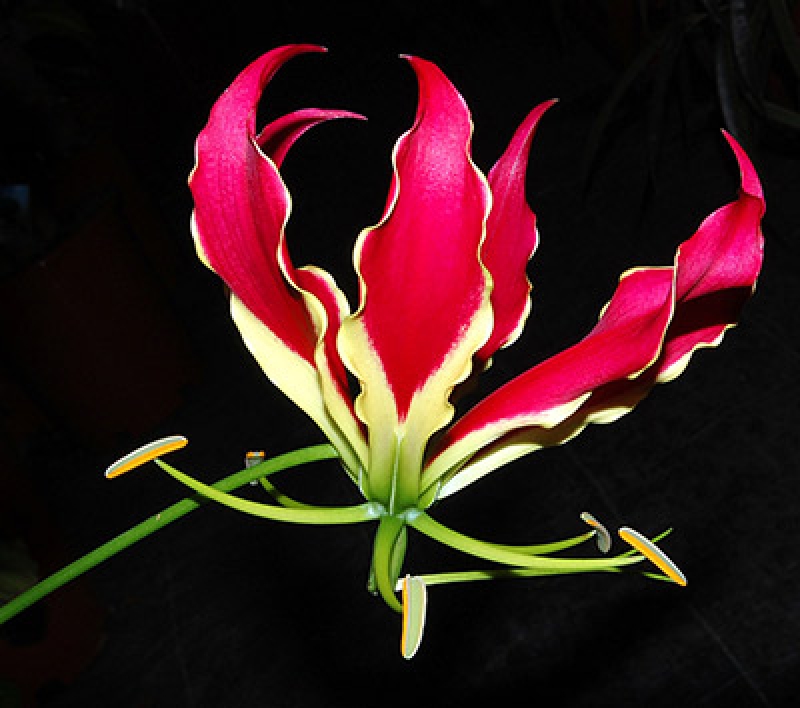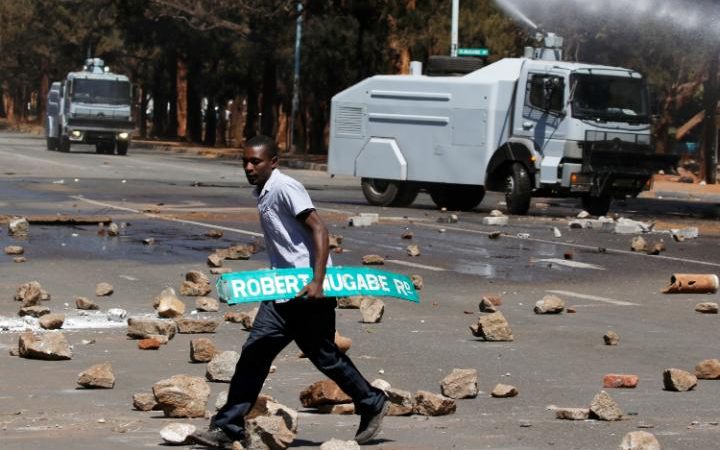We’ve captured Robert Mugabe
Harare – In one of the most unforgettable scenes witnessed in Zimbabwe this past week, an opposition protester struck the pose of a triumphant boxer, holding aloft a street sign emblazoned “Robert Mugabe Rd”.
“We’ve captured Robert Mugabe,” screamed the protester, as if displaying a word championship title belt.
The stone-throwing youths had just overpowered Harare’s much-feared riot police and barricaded roads leading to the city centre, declaring a liberated zone. When police used tear gas, the youths quickly picked up the canisters and threw them back, sending the terrified police officers scampering for cover.
The victory pose was an iconic moment, quite simple in execution but very humiliating in it’s statement. The victorious protesters were overjoyed with their war trophy and repeatedly proclaimed that, in a sense, they had “captured Robert Mugabe”.
Barely 1km from the protesting youths, the real Robert Mugabe was hosting Sierra Leone Vice-President Victor Bockarie Foh and as always trying to convince the world that all is well in Zimbabwe and there was nothing to worry about. The Vice-President had come to officially open the annual Harare Agricultural Show, but tellingly the public terraces were empty.
Smarting from his humiliation, Mugabe issued a stern warning to the opposition, saying “They are thinking that what happened in the Arab Spring is going to happen in this country. That is not going to happen here,” said the 92-year-old Mugabe.
He was speaking after police had fired tear gas and beat up opposition protesters demanding electoral reforms ahead of the 2018 national elections.
A team of police were deployed to seal off the starting point of the planned protest. Despite a high court judge authorised the protest, police continued to violently disperse the opposition crowds. As footage of shocking violence went viral, the UN implored the Zimbabwean government to uphold constitutional rights to freedom of association and assembly.
Angered by the clampdown, the protesters threw stones at the riot police and set tyres ablaze. During this clash, the opposition protestors managed to bring down the signpost of a street named “Robert Mugabe Rd”.
Mugabe was furious as he once again accused foreign governments of fomenting the unrest, “What politics is that when you burn tyres? We want peace in the country,”
Friday’s battle was an escalation post, Wednesday’s violence when police clashed with opposition youths protesting police brutality. The Harare city centre turned into a war zone after police used tear gas and blue coloured water cannons on more than 200 protesters marching to hand a petition to the Ministry of Home Affairs.
Unlike previous clashes, where protesters have run for cover once tear gas is deployed, the opposition protestors stood firm and fought back, taking the riot police by surprise. They accused police of sparking the violence by attacking peaceful marchers.
As the central business district turned into a battle zone, the angry protesters threw stones and tear gas canisters back at the police who had deployed them in the first place. In the escalating battle, the opposition burnt a police van and one other owned by the state-run Zimbabwe Broadcasting Corporation.
A supermarket owned by Vice-President Phelekezela Mphoko was ransacked, with groceries and $12 000 (R172 000) looted. A nearby electronic store was looted in the widening violence, with people sprinting off with laptops and TV sets.
Overpowered by the protesters, the frustrated police began randomly beating up passers-by and journalists they came across, blaming them for the violence. Despite pleas of innocence, a middle-aged man carrying a Bible was soundly beaten by truncheon-wielding officers. In a spine-chilling incident, police lobbed a tear gas canister into a commuter minibus full of passengers.
The dazed driver panicked and sped off, with terrified passengers jumping out of the moving minibus through windows.
Since the outbreak, over a 100 suspected protesters have been arrested on charges of public violence. The opposition MDC-T accused the government of planting “agents provocateurs” among protesters. George Charamba, believed to be Mugabe’s spokesman, declared war on opposition protesters, warning them the Zanu-PF government would pay scant regard to international opinion.
Leaders of the main opposition, Joice Mujuru of Zimbabwe People First and Morgan Tsvangirai of the Movement for Democratic Change, condemned the police brutality.

